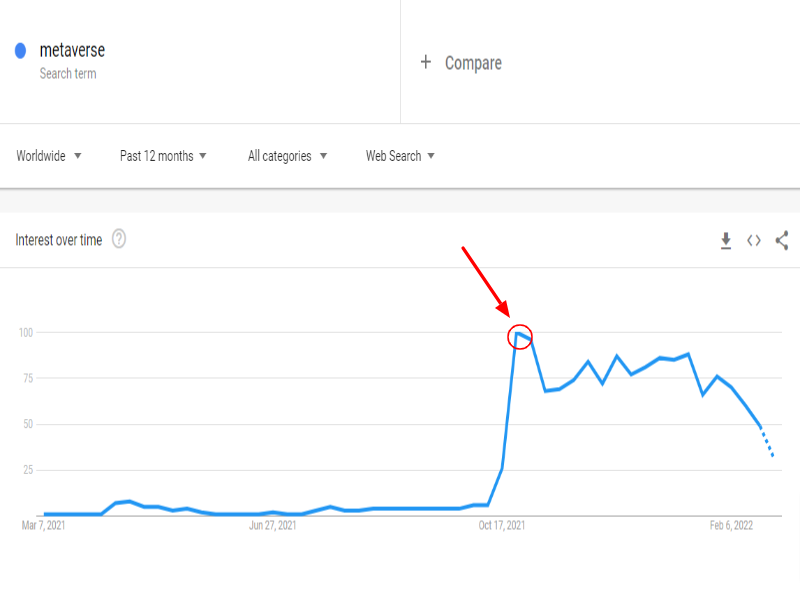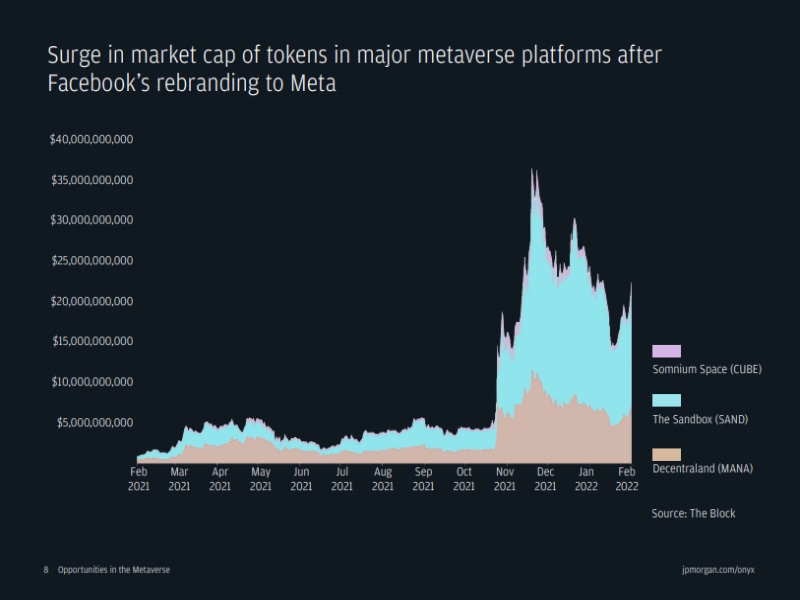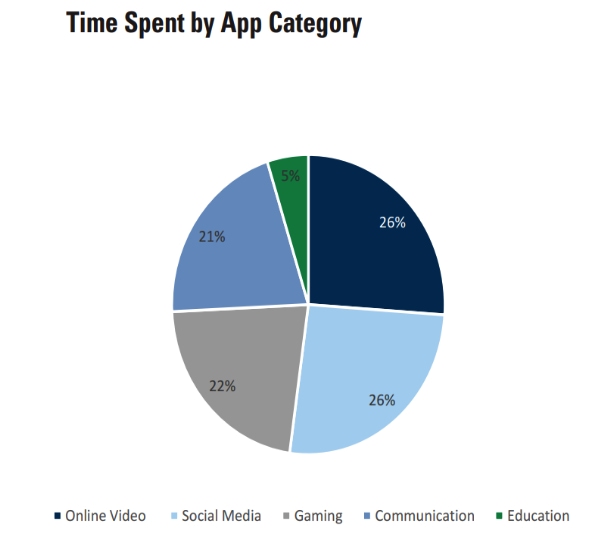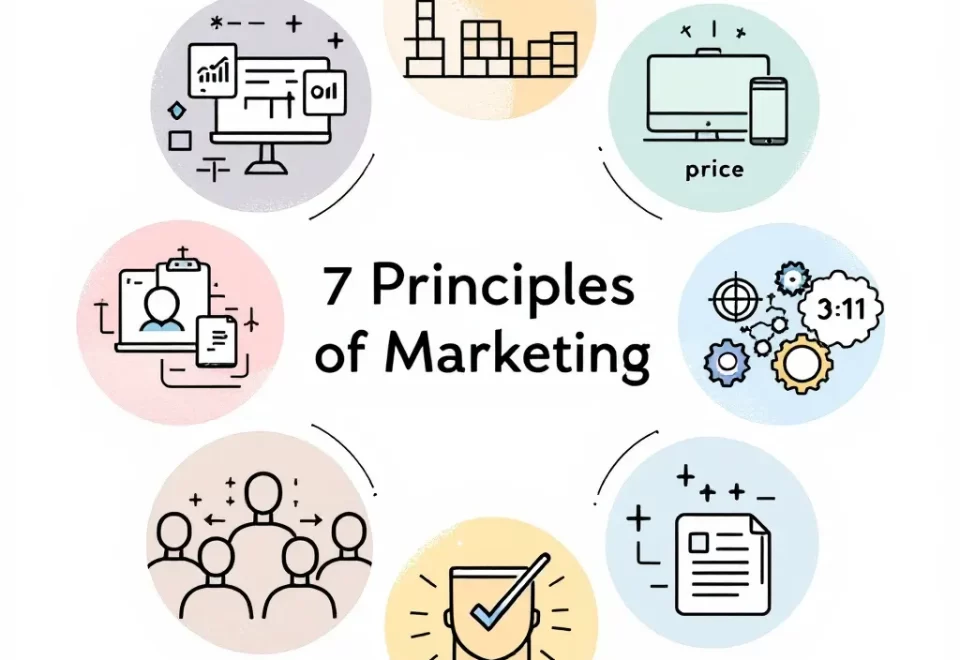Is “Metaverse” a buzzword, a joke, or a big breakthrough in technology?
Since the rebranding of Facebook to Meta last year, public interest around Metaverse piqued high as seen in the Google Trends image below.
Some claimed Metaverse to be the biggest marketing platform, while many think it’s far from becoming a reality. Now that the dust has started to settle, it’s time to really deep dive into what Metaverse is and understand what the future of marketing would look like.
A Deep Dive Into The Metaverse
If I tell you, would you believe the term Metaverse was coined almost 30 years ago?
Yes, it’s true!
The first mention of the Metaverse is found in the science fiction novel Snow Crash by Neal Stephenson, which was published back in 1992. He perceived the Metaverse concept as seeing a vibrant 3D virtual world that would hardly be distinguishable from the real one.
Neal’s idea of people escaping the dystopian world by using their digital avatars to explore the online world is extremely close to what the Metaverse has turned out to be today.
Thanks to the convergence of virtually enhanced physical reality, Metaverse can be described as a virtual collaborative & shared space that sums up not only virtual worlds but also augmented reality and the internet. But the question still remains who really owns Metaverse?
After the rebranding stint by Mark Zuckerberg, everyone seems to believe Metaverse is owned by Meta. A cognizant mistake or confusion to say by referring to his own company as Metaverse. Smart move I’d say!
What Mark is trying to build is a Metaverse of his own for sure, but it’s not the only one out there. Is it? Something I’ll delve deeper into later on.
But for now, on to the real question. Owning Metaverse would mean owning the whole internet, which seems unfathomably impossible. Similar to how people access the internet, they’d be able to access the Metaverses and games, goods, arts, and everything else inside them.
But what Metaverse is and how can we best describe it? Let’s get that out of the way once and for all:
What is Metaverse?
When broken down, the prefix ‘Meta’ means beyond and the ‘Verse’ means universe.
For different people & industries, Metaverse can have different meanings. However, it can be referred to as a future version of the Internet that people can access using their VR and AR devices rather than handheld mobile or laptops.
Imagine entering a virtual store through your VR & AR gears to shop online, meet friends, attend music concerts, and do other things. In this virtual world, you can experience things like walking down an aisle of a supermarket or attending a workplace meeting to improve productivity and many more from the comfort of your home.
In simple words, Metaverse is a virtual world where people can socialize, play, attend virtual events, purchase digital goods & arts, and do all sorts of other things. It’s built on the concept of presence, immersion, and interactivity.
Fortnite and Roblox are the best examples of Metaverse virtual worlds yet. They have been here for quite a long time now and even gained popularity way before Zuckerberg’s Metaverse.
As reported by The Verge, the Marshmello concert — an event held on Fortnite — was virtually attended by 10.7 million people. Another report on Billboard mentioned singer & rapper Travis Scott’s Astronomical music concert on Fortnite drew over 45 million viewers. That’s big! Wait for the HUGE.
Roblox amassed 500 million visits to its Twenty One Pilot’s pre-concert.
Gucci, Balenciaga, and others have also entered the virtual reality world with their digital goods and arts.
So, it’s safe to say, Metaverse has opened doors of new marketing strategies for these well-renowned brands. However, Metaverse Marketing feels a bit vague due to its early impressions. Let’s delve deeper into understanding what it is.
Do you want to leverage metaverse marketing and grow your business?
Understanding Metaverse Marketing
Marketing will see true evolution in the sense of Metaverse. From print ads to digital marketing, and now Metaverse marketing — the industry has come a long way. Still, digital tools such as search engine optimization and others won’t go anywhere for at least the foreseeable future. You’d still need help from expert digital marketers and SEO professionals.
Metaverse marketing will enable virtual avatars of users to participate in entertainment, music, and gaming events to connect with brands in a way never imagined before.
As described by Matthew Ball, Metaverse continues to evolve and never resets, pauses, or ends — generally not the case in any virtual game. And due to this potential of Metaverse, marketers need to understand that this virtual world is not a new trend that’ll fade away with time. Albeit, it’s a new big thing and possibly the future for digital marketing.
Brands can surely market their product or arts in Metaverse to attract, engage & connect with consumers. But how can Metaverse be distinguished from real centralized worlds? Let’s dive right into it:
Centralized & decentralized virtual worlds
The typical internet platforms like social networks work on a centralized system, where a central authority is in control. For instance, Facebook from Meta will be in control of what happens on the platform.
Blockchain technology — an underlying technology of Metaverse — will transform this centralized world into a decentralized one, where the environment is fully independent and enhanced.
Currently, Metaverse is hanging between both worlds, and the progress to make it fully decentralized is underway. However, credits to Meta’s (ex Facebook’s) history, it’s predicted that Metaverse by Meta could be a closed and centralized ecosystem.
Fungible & non-fungible tokens in metaverse
Since any physical or virtual world needs the ability to travel, trade, and purchase, that’s where the Metaverse economy comes in. And Non-Fungible Tokens (NFTs) are one of the key factors that help flourish the Metaverse economy. What the hell is an NFT?
Fungible tokens refer to an item that can be exchanged for another while NFTs are digital assets like Bitcoin but are unique, irreplaceable, and interchangeable.
This ecosystem gives birth to an open and fair economy that is built on top of the blockchain. The gaming industry has already utilized the concept by introducing a Play-to-Earn system, which can bridge the gap between NFTs and Metaverse.
After Facebook’s rebranding to Meta, NFT saw a surge in market cap in major Metaverse platforms as seen in the image below:
While many NFTs hold a monetary value, others have the unique ability to allow users to join communities similar to what Twitter has done. NFTs can also be used as digital avatars or worn by the digital avatars in Metaverse just like what Coca-Cola has come up with.
Even NFT.NYC uses NFT-based tokens as an entry ticket for its virtual events. Thanks to the drastic rise in the use of NFT, the future of Metaverse Marketing has endless opportunities.
Now is the time to level up your business with metaverse marketing.
The Future of Metaverse Marketing
The next generation of users places more importance on social and virtual elements. Brands need to go above and beyond to meet customer expectations in this regard.
As reported by Goldman Sachs report, online video, social media, and gaming platforms have a high screen-on-time ratio.
The thing to note here is our encounter with personalized ads on such platforms. Now that the unique force of Metaverse has come into play, much more precise and valuable data will become available for marketers and advertisers than ever before.
This will drive the future of marketing toward a more enhanced sophisticated targeting.
Brands could create their digital twins in the Metaverse and dictate the future of marketing. Even online shopping could completely shift to Metaverse shopping. Digital avatars of influencers on social platforms could work with brands in Metaverse to drive potential traffic.
People are even more interested in buying real estate properties and lands in the form of NFTs on the Metaverse than in the real world as seen in Decentraland & Sandbox gaming platforms.
As per one CNBC report, real estate sales on major Metaverse platforms have topped the $900 million mark in this year and are expected to cross $1 billion by the end of this year.
And hear this, last year, the Metaverse market was worth $520 billion and is predicted to reach $1.2 billion by the end of the decade. JP Morgan — a multinational investment bank predicted Metaverse could infiltrate every sector to generate $1 trillion in yearly revenues in the coming years.
Goldman Sachs — another multinational investment bank also predicted that Metaverse could become an $8 trillion economy. In the Understanding the Metaverse and Web 3.0 podcast on Exchanges at Goldman Sachs, Eric Sheridan explained the various outcomes from $2 to $12 trillion and $8 trillion being the midpoint.
In a nutshell, Metaverse is on course to open endless opportunities for marketers across the globe. But how can brands get into the game to taste a piece of the pie?
How Brands Can Leverage Metaverse Marketing?
Metaverse Marketing will open doors for marketers and creators to bring innovation that the world hasn’t experienced before. It can aid brands to build their twin personalities in the virtual world, and reinforce their staunch of being an innovative and trendy company.
Other than being collectible, gaming tokens, and event tickets, NFTs have many use cases for Metaverse Marketing. And brands have discovered how to capitalize on NFTs.
They are not betting on the Metaverse and NFTs just for entertainment purposes but leveraging them by introducing exclusive items and digital arts their fans can get their hands on.
Brands including Taco Bell, Crockpot, Campbell’s, Puppy Bowl, and many others have already joined the bandwagon by launching their NFTs.
Even Salesforce is working on an NFT cloud service as reported by CNBC. Time Magazine — co-owned by Marc Benioff (Founder, Chairman & CEO of Salesforce) and his wife — has released an NFT collection called TIMEPieces.
In similar ways, brands can leverage Metaverse and NFTs to their advantage.
Final Thoughts About Metaverse Marketing
From the first impressions, Metaverse does sound interesting and promises a bright future for marketing. However, the journey is not going to be easy and streamlined. There’ll be challenges along the way for brands and Metaverse companies to overcome.
For instance, the biggest issue Metaverse companies can face is accessibility because of the technological requirements that the virtual world needs. Also, brands need to be careful while navigating through Metaverses as without the seamless integration, it’s going to be crucial for them to not alienate their users.
Metaverse surely offers a promising future to level up digital marketing and brands to take a pie their home. The only thing that remains to see is how brands come up with solutions to build an infrastructure where these bottlenecks do not create a pain in the neck.
Growth Hackers is an award-winning web3 marketing agency helping businesses from all over the world grow. There is no fluff with Growth Hackers. We help entrepreneurs and business owners with metaverse marketing, generating qualified leads, optimizing their conversion rate gathering and analyzing data analytics, acquiring and retaining users and increasing sales. We go further than brand awareness and exposure. We make sure that the strategies we implement move the needle so your business grow, strive and succeed. If you too want your business to reach new heights, contact Growth Hackers today so we can discuss about your brand and create a custom growth plan for you. You’re just one click away to skyrocket your business.








